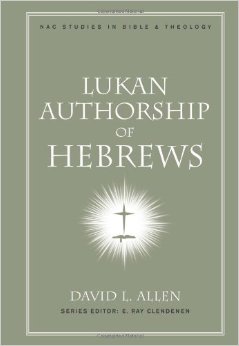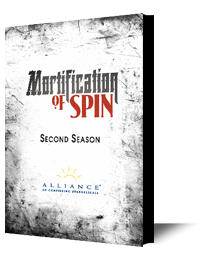Did Luke Write Hebrews?
 Well, he had me by page 31. Of course, I want it to be true. A while back ago, I wrote an article about my top three questions I have when I get to heaven. What I only hinted at then is my cockamamie housewife theologian theory. I was too embarrassed. But now, thanks to David Allen, I am going loud and proud.
Well, he had me by page 31. Of course, I want it to be true. A while back ago, I wrote an article about my top three questions I have when I get to heaven. What I only hinted at then is my cockamamie housewife theologian theory. I was too embarrassed. But now, thanks to David Allen, I am going loud and proud.
You see, after teaching Hebrews for the last year (or so), I couldn’t shake the suspicion that we were getting something very similar to the “explanation” Jesus gave to the two disciples on the way to Emmaus. What if the mystery disciple on the road to Emmaus was also the writer to the Hebrews? Although it’s merely a theory, some people believe the unnamed disciple to be Luke. Allen gives us much more than a theory on the writer of Hebrews. He gives us a polite scholarly smack down. And even if Luke wasn’t the unnamed disciple, he is the one who gives us the most detailed account of the Emmaus event, showing a knowledge and interest in this amazing exposition Jesus gave about how all the Scriptures pointed to and found their fulfillment in him. Just saying.
But let’s move on to this wonderful, well-written book. I doubt Allen had housewife theologians in mind when he wrote this almost 400 page, scholarly hardback. And I can only review it as an inquiring lay person. When he is breaking down Greek phrases, along with the use of Greek present tense form, well, I kind of have to take his word for it. But, without sacrificing the academic integrity of his work, Allen has written accessibly enough for an interested lay person such as myself. If there are any smarticle (my daughter's word) people who are reading this post, I’m sure you will benefit from Allen’s work much more than I did, but I am very grateful for the education it gave me.
I have a whole new appreciation for Luke—doctor, historian, and linguistic master. “Both Luke and the author of Hebrews are described by most New Testament scholars as the most literary writers of the New Testament” (139). A writer would do well just studying the prologues of Luke, Acts, and Hebrews. Luke is doing so much more than telling a story in his Luke-Acts narratives. Both Luke and the writer of Hebrews reveal a masterful use of the Septuagint. And although the genres are different, Luke seems to have a sermon peppered through his narrative. Luke’s purpose to writing to Theophilus in his two-volume work seems to be the same as the sermon to the Hebrews: to motivate him to persevere in the faith by explaining how “Christianity is the fulfillment of the Old Testament hope of Israel” (176).
One thing about this book that really impressed me is the tone. It’s easier to read a scholarly work when the passion of the author is apparent. It’s inspiring. And yet, Allen doesn’t let this passion take the front seat. He “plays the ball” of the argument, and gives both opposing and supporting scholarly arguments their playing time. In interacting with the opposition, he doesn’t discredit the people, he takes their work seriously and even concedes to other possibilities. Allen is confident enough in his work to reveal the solid evidence, be honest about the educated guesses, as well as reveal which arguments are based more on creativity and possibilities rather than absolute certainty. By doing this, he gets 1,000 more credibility points. It also stimulates the reader to use Allen’s research to think for themselves.
So what are his arguments for the case of Lukan authorship of Hebrews? Totally Awesome. Ahem, I mean, they are historical (yep, some fellers in the early church suspected Luke), linguistic (“lexical, stylistic, and textlinguistic evidence), theological, and, drum roll…pretty darn convincing that Luke was in fact a Jew, and not the Gentile that modern scholars have made him out to be. Allen also looks at the main candidates for Hebrew’s authorship (with the presupposition of the Holy Spirit's inspiration) like Paul, Barnabas, and Apollos, and highlights where they are wanting. It’s a pretty exciting read for theological dorks like me. Some parts were amazingly convincing, like the chiastic framework of all three books, the similarities in their prologues, the use of vocabulary, and the comparison of Acts 7 and Hebrews 11. I also found Allen’s notion on the identity of Theophilus and the recipients of Hebrews as converted high priests to be quite interesting. The historical reconstruction that he gives at the end of the book is also conceivable.
Whether one agrees with Allen’s conclusions or not, they will definitely have to wrestle with his work. He has thrown a respectable pitch into the discussion and wondrous study regarding the writer to the masterpiece of Hebrews. I’m happily persuaded, especially with my underlying, biased theory. And although we will probably not know the identity of this writer with 100% surety in this life, I have just learned a wealth of information from Allen in the process of discovery.
*(This article was first posted in March, 2013.)
- Login to post comments




















 © Alliance of Confessing Evangelicals
© Alliance of Confessing Evangelicals



One of my former pastors used
One of my former pastors used to be convinced that the author was Priscilla, because she, along with her husband took the eloquent Apollos aside to explain to him the way of God more accurately (Acts 18:26-28). Apollos had been trained in the scriptures and knew of Jesus, but it was not until Priscilla and Aquila instructed him properly that he was able to powerfully refute the Jews by showing how the Scriptures pointed to Jesus as the predicted Messiah.
I do like the possibility of Luke as author and will definitely look into this in more detail. Thanks!
In reading this a second time
In reading this a second time I wanted to add to the comment I left back in March 2013, Aimee. If Luke is the disciple no the road to Emmaus and if he is the author of Hebrews who shows that OT Scripture points to Jesus, it is consistent - and even a continuation - of what he showed throughout Acts. Take Acts 8, for example: Luke records Philip starting with Isaiah 52-53 in order to use the OT to explain Jesus as Messiah to the Ethiopian. I think we see him recording these types of events repeatedly in Acts from both Peter's and Paul's sermons and statements as well.
It's a repeated theme of his, showing how OT passages point to Jesus. It makes sense that he might then be the author of Hebrews as well.
Yes, there are a lot of
Yes, there are a lot of parallels like that dealt with in the book.
On a lighter note, I recieved an email from a pastor who said that he had a professor in seminary who swore the writer to the Hebrews was a woman. He said that Heb. 13:22 proved it because only a woman could say she had written a "short" exhortation after thirteen chapters. Haha.
This is fascinating. I'm
This is fascinating. I'm neither scholar nor cleric, but have always thought it must be Paul. The arguments against Paul based on style etc., never washed with me because even I am capable of writing in different styles depending on purpose and the audience. And I could never quite accept there could be anyone else with such profound insight and understanding as Paul - but this review has made me think again. Many thanks.
This is definitely a book on
This is definitely a book on my wish list! Thanks for bring it to my attention. Reading Luke 24, though, are they not referring to Peter being the other on the road in verse 34?
Thanks for this, Aimee. This
Thanks for this, Aimee. This idea is completely new to me.
Yes, there's good reason to
Yes, there's good reason to discount Paul as the primary writer, but there does seem to be a lot of his influence in there. Some early church fathers suggested Luke was an amanuensis, translator, or editor for Paul. While recognizing Paulinian thought and influence, Allan makes the case that Luke was the independent writer of Hebrews, and served as Paul's amanuensis for the Pastoral Epistles.
Pauline authorship seems the
Pauline authorship seems the weakest likelihood to me, but I'm just speaking as a lay person who thinks the writing style is so far off what we see in all of Paul's epistles. Luke is a lot more reasonable for my way of thinking when it comes to similarities.
On whether Luke was on the road to Emmaus, I can see it as a possibility. Then again, he is such a careful historian (look at the Acts passages where he is nto personally present for the evets recorded) that he could very well have researched and related the details without being there himself.
Nice job on getting this conversation going here, Aimee.
Tim
P.S. I had to smile when I read this line, because I recognized myself immediately: "I’m happily persuaded, especially with my underlying, biased theory."
P.P.S. So glad you mentioned chiastic structure, because I did the same in my article over at ThinkChristian.net on the Proverbs 31 Woman and now I don't feel like the only theological dork in the room. (Hmm, where'd I get that phrase?)
Boice argues that it was
Boice argues that it was Mary, her sister, Clopas' wife & Mary Magdelene at the tomb. Otherwise, both Jesus' mother & her sister would have been named "Mary". Like you said, it's interesting to ponder.
Agreed with you on the evangelizing. Oh, that I would do more of that!
Very interesting; I guess
Very interesting; I guess that one could also combine my housewife theologian theory with the Mary Emmaus theory. Although, I'm still liking Luke for it. When you factor in Allen's argument for the original recipients of Hebrews, the literary comparisons with Luke-Acts, and the time frame he sets up for Luke being a traveling companion of Paul and Timothy, there's ample scholarship to contend with there.
Yes, Melissa, I'm aware of
Yes, Melissa, I'm aware of this suggestion. It is definitely a contender, but I think that the wording in Luke 24:22 would be a little strange for that interpretation. Mary (Jesus' mother's sister) was one of the women who saw the empty tomb, so wouldn't there be some kind of first person reference there? Or if Cleopas was speaking and his wife was the one accompanying him, wouldn't he point that out a little more clearly? I'm not sure about the Greek language there though, maybe that is the way they would have spoken.
There's also reason to believe that this Cleopas was Jesus' uncle, and the one who replaced James as the head of the Jerusalem church. Interesting stuff. This story just fascinates me. I would think that whoever the recipients were, they would be doing some serious evangelizing afterwards!
Had a prof at Covenant
Had a prof at Covenant Seminary back in the early 70's (I won't embarass him by naming him) who was convinced that a female wrote Hebrews and the ancient church was never willing to reveal that fact.
No female could ever be that
No female could ever be that smart. Sheesh. Some people have to have everything spelled out for them.
TRIB'S TANTRUMS
In "Christ of the Empty
In "Christ of the Empty Tomb", James Montgomery Boice makes a case that it's Cleopas and his wife who are walking on the road to Emmaus. Obviously, we know Cleopas is there, because Luke 24:18 names him. Boice's asserts that his wife Mary was with him (see John 19:25, he says John spelled the name differently, but it's the same man). He seemed to think they were going back home to Emmaus. I'd have to pull the book to look back on the reasons he gives for this.
There are so many things we'll never know this side of heaven, aren't there? Honestly, it's a little frustrating to me at times :-)